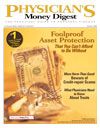Publication
Article
Close-up: Emerging Markets
Author(s):
n.
Emerging Markets: The financial markets of countries who are makingan effort to change, and thereby improve, their economy in order toreach the same level of sophistication as developed nations.
The phrase "emerging markets" is often used todaywhen discussions turn to topics of personal financeand investing. For the average physician-investor,that term typically conjures up images of countries experiencingpolitical unrest and unstable economies. Theimages are usually of small, poor countries where crimeand drug-trafficking are a way of life. However, what weimagine is not necessarily reality.
The International Finance Corporation defines anemerging market as a stock market in transition, manytimes increasing in size or level of sophistication. That tagis then applied to a country looking to change or grow itseconomy. Similarly, the World Bank defines emerging marketsas countries that have yet to reach the minimumgross national product per capita associated with developedcountries. However, not all emerging economieshave a stock market. In other words, emerging markets arelooking to change and/or grow their economies. And agrowing economy can be fertile ground for investors.
Emerging Markets Add Risk
Point of View
The investment adage that states "the bigger the risk,the greater the reward" is certainly true of emerging markets.If a physician-investor is looking to add risk to theirportfolio and is comfortable doing so, an emerging marketis a very viable option. According to a articleby George Hoguet, CFA, emerging markets are "characterizedby diversity, volatility, rapid economic growth,and, frequently, immature institutions."
An example of this is when Brazil—considered one ofthe top five emerging markets—returned 64.3% in 1994and only 6 months later was down 21%. If an investor isprepared to weather the type of fluctuation and risk seenin Brazil, emerging markets can offer a significant opportunityfor diversification. And diversification, in turn, canhelp reduce the amount of volatility in an entire portfolio.
Also, always be prepared for surprises when investingin emerging markets. An article by Tanya Hiebler on the401Kafe.com Web site calls to mind the 1998 collapse ofthe Russian market. It was a shock to most investors.Hiebler points out that "the fundamentals of an emergingmarket stock may look good, and there may be many reasonsto believe the market is stable, but there can still bemarket surprises." So, if you're the type of investor who isnot willing to take a bit of a rollercoaster ride, then emergingmarkets might not be for you.
Opportunity for Reward
Emerging markets do, however, offer the potential forsignificant reward. According to Hoguet, emerging marketshave outperformed global equities by nearly 400basis points over the past 15 years. In addition, Hoguetsays, "each year, one emerging market is frequently thebest performing market in the world." And over the 2-year period of 2003 and 2004, emerging markets havereturned a cumulative 85%. Faster economic growth, relativeto developed markets, is a key characteristic of anemerging market.
Many analysts believe that there's no time like thepresent to invest in emerging markets. Kenneth King, CIO,Rexiter Capital Management, believes that "emergingmarkets are poised to grow over the next few years as thenext upturn in world growth occurs." He points out thatmany important lessons have been learned from the mistakesmade during the decade of the 1990s. Both the governmentsof these emerging markets and the managementof respective companies are wiser. King predicts that"emerging market economies will grow at twice the rateof the developed world."
So if the opportunity for growth sounds appealing,and you don't mind a bit of a stomach-churning ride,emerging markets could be a good fit in your portfolio.Nevertheless, advisors suggest limiting investments inemerging markets to no more than 10% of overall equityholdings.
Emerging Markets Profile
When it comes to selecting an emerging marketeconomy in which to invest, there's more thana handful from which to choose. According to a401Kafe.com article by Tanya Hiebler, more than120 emerging markets are in existence in theworld today. While there is no sure thing when itcomes to investing, recognizing the following keyaspects of favorable emerging market economiescan help in your decision making:
•Emerging markets are characterized as transitionalsocieties. Their economic growth stemsfrom elements that include improving educationaland health standards, numerous technologicaladvances, and a changing political environmentthat leads to increased productivity.
•The World Bank notes that the five biggestemerging markets today are China, India,Indonesia, Brazil, and Russia. Other countries listedas emerging markets include Mexico, Argentina,South Africa, and South Korea.
•Emerging markets also adopt open door policies.The removal of trade barriers and capital controls,combined with the natural resources manycountries possess, makes them an attractiveinvestment option.
POP QUIZ
1) All emerging markets have stock markets. True orfalse?
- True
- False
2) Emerging markets are characterized by
- diversity
- volatility
- rapid economic growth
- all of the above
3) In the last 15 years, emerging markets outperformedglobal equities by
- 200 basis points
- 300 basis points
- 400 basis points
- 500 basis points
4) During a recent 2-year period, emerging marketsreturned a cumulative
- 55%
- 75%
- 85%
- 95%
5) Which country is not among the biggest emergingmarkets today?
- China
- Indonesia
- Russia
- Iraq
Answers: 1) b; 2) d; 3) c; 4) c; 5) d.
